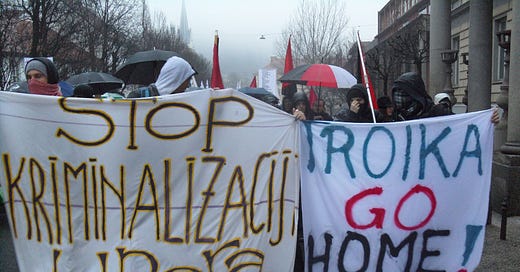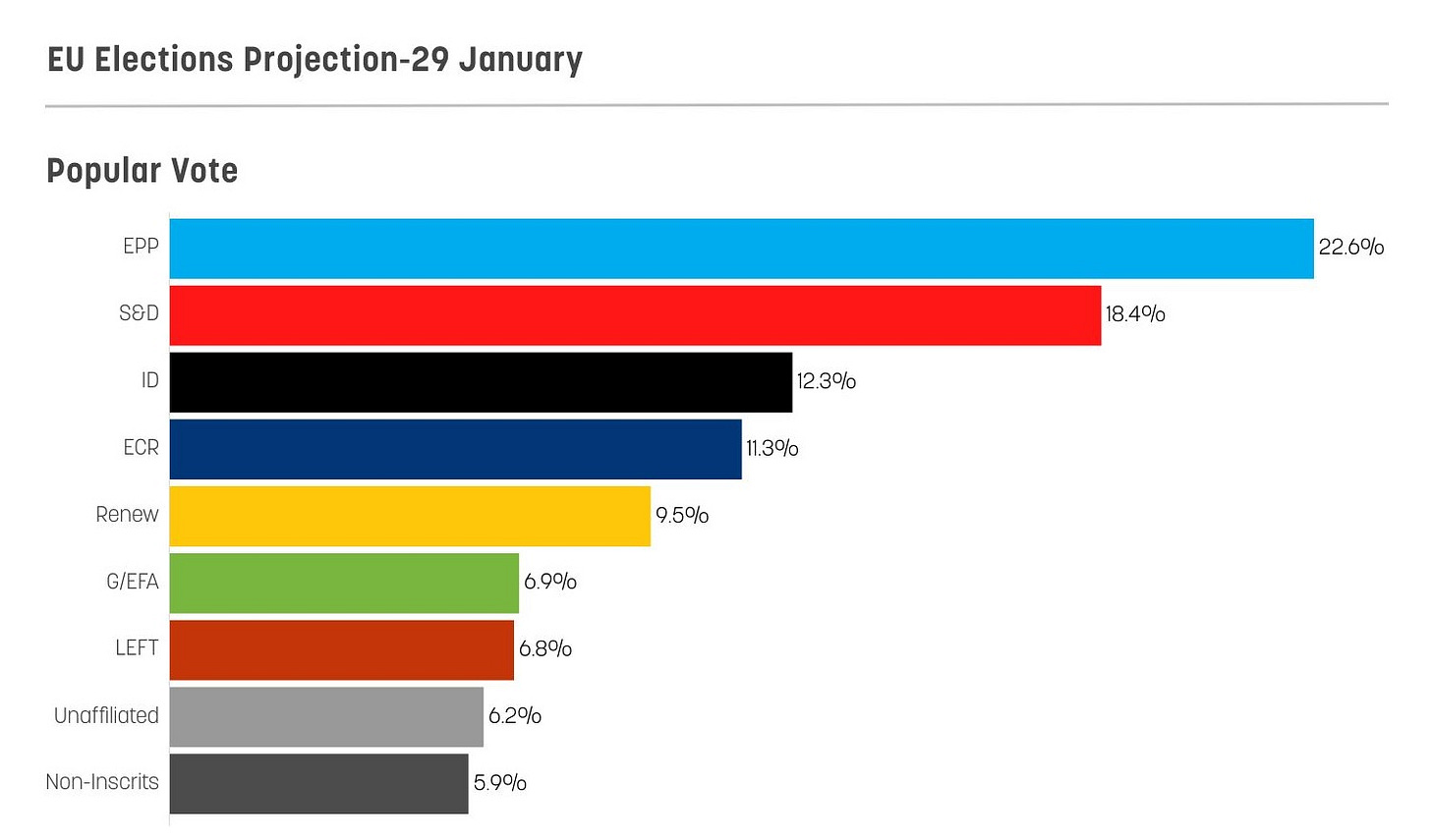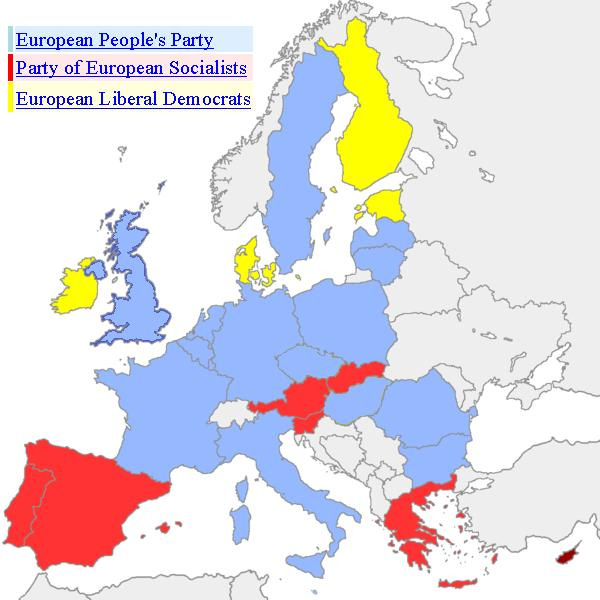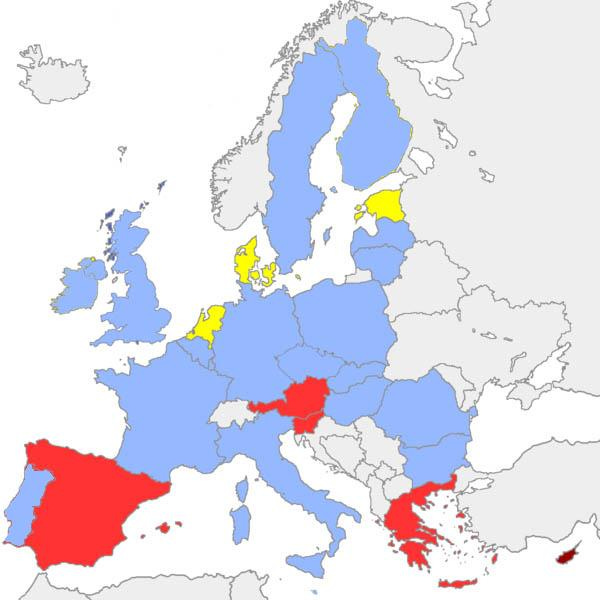Why do Europeans keep voting conservative?
In one of this year's many elections, voters are expected to vote in the majority for a party that's been in power for two decades. Where is this strange democratic oddity? Right here in Europe.
Over the years, when I talk to people on the Left who don’t like the European Union, they usually cite the same reason: “look what they did to Greece in 2010!” I usually ask, “who is they?” Their answer is usually the nebulous “Brussels.” But the actual answer is their fellow Europeans, the people who for two decades have unrelentingly voted to put the government of the EU under the control of free-market conservatives.
The European Peoples Party (EPP), the pan-European group of center-right national parties, wrapped up its party conference in Bucharest on Thursday confident in the knowledge that polls predict they will yet again come first in this year’s EU election – as they have in every EU election since 1999. For the past 25 years, in five consecutive elections, the voters of Europe have made a democratic choice: they want conservatives to run the European Union.
The Parliament is only a third of the EU’s governance. But voters also determine the upper house of the legislature - the EU Council - and (indirectly) the executive branch - the European Commission. The Council is made up of the governments of each EU member state, and for the past two decades the party controlling the largest number of governments has been the EPP. Because of that, the EPP-dominated Council (with the necessary approval of the EPP-dominated Parliament) has appointed someone from the EPP to be EU Commission President immediately following every EU election since 2004: four terms of Conservative leadership under José Manuel Barroso, Jean-Claude Juncker and Ursula von der Leyen. For two decades, the plurality of commissioners in these presidents’ colleges have also been conservative - appointed by conservative national governments and confirmed by a European Parliament in which the EPP is the largest party
At the time of the financial crisis, an astonishing 15 out of the EU’s 27 governments were controlled by the EPP. Voters across Europe chose conservative leadership, and that’s what they got. The EU’s response to the debt crisis was a brutal austerity regime that eroded social services in the affected countries. This response was not anything inherent to the EU itself, it was the result of the EU government voters had chosen. Saying the EU as a project is inherently neoliberal or inherently conservative would be like saying the British governing structures (the parliament itself, not the people in it or voting for it) are inherently conservative. The UK may have been under conservative leadership for the past 15 years, but that doesn’t mean that the United Kingdom itself as a project is inherently conservative. In a democracy, it doesn’t make sense to say that. A democratic entity is a reflection of the governments people choose to put in power.
So why have Europeans been so content to maintain conservative leadership of the EU for two decades? The reasons are myriad, but a main answer is that they don’t realize they’re doing it. Much is made of the EU’s “democratic deficit”, but the EU does have a mixture of direct and indirect democracy. As I’ve long said, what the EU actually suffers from is an “information deficit” – citizens have democratic power but they are unable to use it because their national governments deprive them of the necessary information to wield it. National education systems don’t teach anything about EU civics, not even the basics of how the EU works. Hence most EU citizens don’t know what the Council (the EU’s most powerful institution) is, and they don’t know how the EU president is selected. European national media, which should be filling the information deficit left by their governments and education systems, don’t do the job. In national capitals, it’s in many powerful peoples’ interest to keep citizens ignorant of how the EU works
The EPP juggernaut
When it comes to European politics, the conservative EPP isn’t just any party. It is the party. It has held the presidency for 20 years and dominated the legislature for even longer. From 2009 to 2012, and again from 2017 to 2019, the EPP held three of the EU’s four top jobs - Commission President, Council President and Parliament President – simultaneously. Only the powerless position of High Representative for Foreign Affairs has been given to the center-left Party of European Socialists.
If voters are discontent with the conservative way the EU has been run for all this time, they can vote to turf them out. They can vote for a party other than the centre-right in their national elections and in the EU elections. But they don’t. During the financial crisis and in the years after, voters chose the center right and rejected the left at the ballot box. By 2012, the center right was in power in 19 of the EU’s 27 countries, controlling the overwhelming majority of votes in the Council. Europe was starting to look like a one-party state. The situation has become less dramatic in the ensuing years thanks to the British Conservatives leaving the center-right EPP to found the hard-right-to-far-right ECR (and then leaving the EU altogether), Macron winning in France in 2017 and subsequently uniting with the Liberals, and Scholz winning in Germany in 2021 for the center-left. But despite not controlling any large country’s government (until the new Polish government came to power at the end of last year), the EPP has managed to retain power at EU level.
On Thursday, Ursula von der Leyen was coronated as effectively the only candidate running to be European Commission President in this year’s EU election at the EPP congress in Bucharest. She has been spending the past weeks gaslighting EU voters by telling them why she “decided to run” for the office back in 2019. Of course, she didn’t run. Six other people did in an attempt to bring more democracy into the process of selecting a president. The Council ignored those candidates and plucked von der Leyen from obscurity to tell her she was going to be the next EU president. Because the EPP had come first in the election, it was expected that the presidency had to go to that group but leaders did not have confidence in the abilities of the candidate the EPP had officially run during the election – Manfred Weber. Now, with the EPP again expected to come first in the election, von der Leyen’s reappointment is considered a fait accompli. She is the Council’s choice. The only thing that could complicate things for her is if the far-right ECR and ID parties receive such a surge in votes in this election that it makes a centrist majority coalition in the parliament impossible, and results in a right-wing EPP-ECR-ID coalition that would require the appointment of someone more conservative than von der Leyen in order to get confirmation in the new parliament. In other words, center-right Ursula von der Leyen is the best that progressives can hope for as EU president in the next term. It’s either going to be her, or someone on the hard right who is flirting with Europe’s fascists.
It isn’t just the far right that views von der Leyen with suspicion. The right wing of the EPP is also angry with her because of her Green Deal, and they have been campaigning against it. At the Bucharest party conference, 737 delegates were eligble to vote. But only 499 chose to do so in the uncontested contest. Von der Leyen received 400 votes. 89 delegates voted against her, 10 officially abstained (and 337 did so unofficially by not voting at all). She is in trouble with the right wing of her party, and if the election results in an EPP alliance with MEPs who are even further to the right, it may be impossible to get her confirmed.
Today’s election in Portugal will be a bellwether for the EU election coming in three months. For the first time since the fall of the fascist dictatorship in 1975, Portugal has a strong far-right party – mirroring developments next door in Spain. Center-left Prime Minister Antonio Costa, who had been running the country since 2015, resigned in November during a corruption probe in which people close to him were implicated. The center-right Democratic Alliance, made up of EPP parties, is expected to get 31% of the vote according to polls, only slightly above Costa’s center-left party at 29%. But DA may form an alliance with the surging far-right Chega party, a member of Marine Le Pen’s ID group at EU level, who are expected to come third at 18%.
Such an EPP-ID alliance at national level would mirror what exists already in Italy (where ECR member Brothers of Italy is also in the coalition) and would suggest a wider European result that could yield a similar right-wing coalition is coming at EU level. All of this will not be some kind of troika diktat undemocratic EU bureaucrats are forcing upon citizens against their will. This is what citizens have been voting for, for a quarter century now - only now European voters have decided to lurch even further to the right. As the election draws nearer, it’s worth asking what are the dynamics that has been making the public keep voting for an EU government that has been in power already for so long. And why is it that, even if many of them choose something different in this election, they will not choose to go left but instead appear ready to go even further to the right?
Why do Europeans keep voting conservative?









